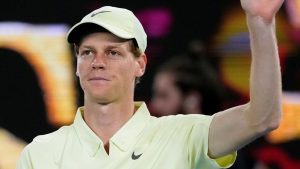England, Boks meet in a RWC final not for the faint-hearted


TOKYO (AP) — During one of England’s practice sessions this week, front-rower Kyle Sinckler donned a hoodie and a pair of boxing gloves and started vigorously sparring with a strength-and-conditioning coach.
What better way to prepare for what could prove to be the most brutal Rugby World Cup final there has ever been.
After six weeks, 47 games and one deadly typhoon that briefly wreaked havoc with the first World Cup to be staged in Asia, the winner of rugby’s biggest prize will be determined in a contest between the two most physically intimidating teams around.
England vs. South Africa.
“What we are going to witness,” England defense coach John Mitchell said, setting the stage perfectly, “is the two most powerful rugby teams in the world.”
Titanic. Brutality. Collisions. An immense battle. Fighting fire with fire.
They are all words or phrases that have been uttered by players and coaches in news conferences across Tokyo this week in relation to a final that will not be for the faint-hearted.
“We are going to see who is the bravest, who crosses that line, who wants to dominate the opposition,” said South Africa flanker Pieter-Steph du Toit, clearly relishing what lies ahead on Saturday.
The Springboks, World Cup winners in 1995 and 2007, and 2003 champion England have long prided themselves on their physicality. In one encounter — at Twickenham in 2002 — that got particularly nasty, then-South Africa captain Corne Krige lost his cool and swung a punch at an Englishman — only to miss and knock out his own flyhalf, Andre Pretorius.
One tweet, sent by former Ireland international Stephen Ferris before the World Cup, showed the Springboks squad posing for a photo with their jerseys off and muscles flexed. It is quite a sight.
Three members of South Africa’s starting pack on Saturday are more than two meters (6-feet-7) tall. The eight-man forward pack weighs a combined 927 kilograms (2,044 pounds), 7 kilograms (15 pounds) more than England’s.
“The challenge has been laid out by South Africa,” said Billy Vunipola, one of England’s hard men, “and the challenge is going to be up front.”
There’s every chance, though, that the two giant packs will cancel each other out. It might come down to one or two inspirational moments from the players behind the scrum instead.
Will it be South Africa’s scrumhalf Faf de Klerk, always busy and easily identifiable with his flowing blond hair? Or his dynamic teammate Cheslin Kolbe, a fleet-of-foot winger with unreal acceleration?
As for England, George Ford is the director at flyhalf. Jonny May is a tall winger who knows how to find the tryline. How about backup scrumhalf Ben Spencer being the accidental hero, having only been called into the squad five days ago as an injury replacement?
“We need to be good in the arm wrestle,” England coach Eddie Jones said, “and when we have the opportunities to break the game up, we are then confident and composed enough to take them.”
The only northern hemisphere country to win the World Cup, England wouldn’t want to have anyone else leading the team into the contest other than Jones, a wily Australian working with a fourth different country in nine editions of the tournament.
Jones led Australia to the 2003 final, consulted to the Springboks’ winning campaign in ’07— when they beat England 15-6 in the final — and now he’s back in the title match with England after masterminding a 19-7 win over New Zealand in the semifinals . That might go down as England’s greatest ever performance, considering how comfortably the defending two-time champion All Blacks were smothered.
If England wins on Saturday, it will have beaten all three of the traditional southern-hemisphere heavyweights in the knockouts, a feat certainly deserving of the title.
And it will mark an amazing turnaround from the 2015 tournament that England hosted — and exited at the pool stage in embarrassing, unprecedented fashion.
The Springboks will start as underdogs but will be tough to subdue, having only lost once in 2019 — against New Zealand in the pool stage. They broke the hearts of host nation Japan in the quarterfinals and eked out an ugly victory over Wales in the semis.
Rassie Erasmus took charge in early 2018 with the Springboks low on belief and ideas. He has got them playing to their strengths again — the set piece, heavy defense and a strong, tactical kicking game — and the results have followed.
“They’ve got a history of being the most physically intimidating team in the world,” Jones said, “so we’ve got to take that away from them.”
The sight of South Africa being led out by Siya Kolisi, the first black player to be appointed Springboks captain , will also be poignant for a country that is still trying to fully emerge from the apartheid era.
Kolisi lifting the Webb Ellis Cup would be a powerful and transcendent image, 24 years after South Africa won its World Cup title in front of Nelson Mandela, who’d recently become president in a democratic election after decades of racial segregation and his own long imprisonment.
Sinckler and the rest of England’s heavyweights will be fighting hard to make sure that doesn’t happen.






